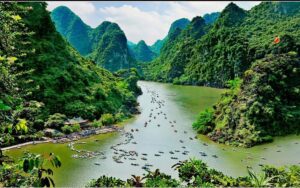Trang An scenic complex was recognized by UNESCO as a world cultural and natural heritage on June 23, 2014 with 3 criteria: Culture, aesthetic beauty and geology.
Trang An scenic complex has an area of 6,172 hectares located in Hoa Lu, Gia Vien, Nho Quan districts, Tam Diep city and Ninh Binh city, about 90 km from Hanoi capital, is an area with harmony. combination of nature and culture. Trang An scenic complex includes three adjacent protected areas: Hoa Lu ancient capital historical and cultural relic area, Trang An – Tam Coc – Bich Dong scenic area and Hoa Lu special primeval forest.
Trang An is a prominent place in Southeast Asia and around the world, containing rich archaeological evidence and still preserved almost in its original state, mainly snail shells, seashells, and animal bones. , pottery, stone tools, kitchen floors, rope pottery and human remains. This is an invaluable treasure trove of documents showing the adaptation of prehistoric humans to important environmental changes lasting more than 30,000 years, at least since the last ice age. During this period they experienced some of the most extreme geographical and climatic changes in earth’s history. Besides, historical cultural relics such as temples, pagodas, and palaces also contribute to supplementing and consolidating many archaeological documents.

The Trang An Karst Tower landscape is one of the most beautiful and spectacular of its kind in the world, consisting mainly of a series of conical karst towers with steep walls 200m above the surrounding ground and water level. Intertwining the pyramid-shaped mountain peaks is a system of karst valleys and sinkholes of varying depth, with wide alluvial swamps, connected by underground streams through the mountain, forming countless caves. Suddenly, the ceiling of the cave sparkles with stalactites of various shapes. Along with the thick primeval forests covering the cliffs are sacred temples, pagodas, shrines and the landscape of the buffer zone around Trang An, creating a vivid and charming picture of traditional rural life.

Trang An demonstrates the final stages of Karst evolution in a humid tropical climate. The product of the process of strongly cutting large limestone blocks over millions of years is a series of towers, valleys (karst pits), valleys (sinkholes), landslide structures, sedimentary layers, and underground caves. and underground rivers, caves and cave deposits.
